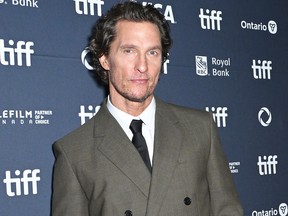Matthew McConaughey, poet?

Article content
What is a poem? The actor Matthew McConaughey, who’s written what’s likely to be the best-selling book of poetry published this year, has some thoughts on the matter. Poems are serious: “They illuminate belief,” he writes early in his new book, “Poems & Prayers.” But they’re also not serious: “Poems are a Saturday in the middle of the week.” That’s McConaughey-brand thinking in a nutshell, fitting for a man who worked hard to get an Oscar but who cruised to success on an earthy, easygoing persona. For him, poems involve some hard thinkin’, but they’re a low-stress way to deal with this business of livin’.
How to reconcile the two? Who can say? As he muses early on, “It’s all a paradox.”
Still, the reason for this book’s existence is uncomplicated. McConaughey’s autobiography/ersatz lifestyle manual, “Greenlights,” published in 2020, has sold a gobsmacking 6 million copies. The book’s success is due in no small part to the fact that, unlike a lot of celebrity memoirists, McConaughey was unafraid to tell ordinary folks how we, too, can make better lives for ourselves. But his advice all but vaporized on arrival: It either came pillowed in woolly musings about just letting things be, or was so McConaughey-specific that it was hard for mere mortals to act on. (Refuse all rom-com starring roles going forward. Check!) Whether you read “Greenlights” cover to cover or never cracked the spine, you’d be doing right by McConaughey’s philosophy of life.
“Poems & Prayers” (which is now in stores) is more of the airy, kinda-helpful-but-kinda-not same. Poems can be a lot of things: Studies in imagery and metaphor, attempts to crack open our understanding of what words signify, pathways into subtler emotions, appreciations of nature, human and otherwise. For McConaughey, though, they’re usually just one thing: oracular statements that rhyme. Sometimes that takes the form of Dr. Seuss uplift: “Be best at what you’re good at not better at what you’re not, / win again at what you won at before you fight with what you fought.” Sometimes it likens bad stuff happening to feral animals, circling vultures and the like: “The bad wolves we feed / the wounds we cut ourselves to bleed.” Often it’s about gratitude, either for his family, his God, or for finding a port-a-potty just in time. (“My prostate in a pinch … I was grumpy as a grinch,” he writes in a poem titled, alas, “Deuces.”)
Like his casual-dude advice in “Greenlights,” McConaughey’s poems are filled with elliptical, self-cancelling statements that confuse wordplay with meaning. We should “own to rent before we rent to own.” We should look “where the dream is God and God’s the dream.” “Every time we stand to be corrected,” he cautions, “we also stand to be correct.” “With everything so certain,” he writes in a poem called “Dear God,” “it’s all in doubt.”
Are these poems workin’ hard or hardly workin’? To be fair, McConaughey makes no claim to being a serious poet, and the pieces collected in “Poems & Prayers” evoke the most nakedly populist schools of the form: Beat, cowboy, Insta. But, in typical McConaughey fashion, he doesn’t not take poetry seriously either, and his book is thick with scriptural references and appeals to God. Though the title suggests poems and prayers are separate, he also notes that “my prayers are my poems are my prayers.” (See “paradox,” above.) So while the poems aren’t very good and are sometimes actively bad, stuffed with banalities or forced diction to pull off a rhyme – “sights are high without tippy a toe” or “A verb of passage not a noun of pro” – there’s no question he means every bit of it.
There’s even something of a fairly meaty theme that emerges across the book, one that even occasionally unsettles McConaughey’s take-it-easy-but-take-it persona. It’s time: He doesn’t have enough of it, isn’t sure how to use it, chafes at others’ schedules but can’t live wholly on his own. “Time was a trade, / negotiable only if I wanted to keep it, / which I did not,” he writes, in one of his better non-rhyming poems. (A note says he wrote it on a hammock.) In a spikier piece of light verse, “Streamers in the Hall of Justice,” about a court appearance he made to get a restraining order on a stalker, he’s bemused at how long he’s had to wait for his moment in front of a judge, and how quickly justice was served. (“Well, that was a success, just not the way I expected, / makes me more suspicious of those we’ve elected.”)
And floating by itself, there’s a dark little proverb about mortality: “People will die in your life who you will know would have lived longer had you been a better friend.”
It will do no good to wish there was more of that tart, dark directness in McConaughey’s poetry. His vibe is what it is: good whiskey and good cheer. If that appeals to you, try imbibing it in another form – listen to it. In the audiobook version of “Poems & Prayers,” McConaughey plainly delights in the messages his poems deliver, usually punctuating the titles or final lines with a chuckle or a whoop or an approving “mmmhmmm” and “yup.” Listening to him read, I nearly gave in. Yes to warmed-over Whitman, yes to harmless pseudo-philosophy, yes to folksy rhyming poems. “When our life has rhythm we can dance through it,” he writes. “And the struggles start to feel more like snuggles.” Mmmhmmm. Yup. That’s a rhyme for sure.
– – –
Mark Athitakis is a critic in Phoenix and the author of “The New Midwest.”
– – –
Poems & Prayers
By Matthew McConaughey
Crown. 208 pp. $29












Postmedia is committed to maintaining a lively but civil forum for discussion. Please keep comments relevant and respectful. Comments may take up to an hour to appear on the site. You will receive an email if there is a reply to your comment, an update to a thread you follow or if a user you follow comments. Visit our Community Guidelines for more information.